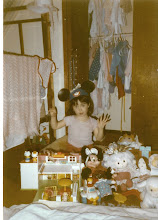No memory is concrete, each will leak, each will crack, each will put forth one empty slice, a lacuna one must fill up with some other substance: ribbons, sand, wax, sugar, imagination.
She is home in young adulthood, sitting in the doctor’s office. She has a nasty rash.
There was a park behind her the house she grew up in where the boys and she would play war. Her brother, her, the neighbor boys – launching themselves over the balcony like smoke bombs, riding over stomachs on her bicycle, taking hostages. Morad lived next store, an Iranian boy, his Arabic name meant desire. He was her very favorite, she’d hold him hostage by the throat in the playhouse for hours, her soft girl fingers pressing into his neck as she whispered, “caught you again.” Because outside she always caught him, she was faster, stronger and quicker than he, it was she that cast her shadow over him.
Things changed when they went back indoors, when it became too hot or cold or dark in the park and she moved with him to that warming, domestic space. During this transition he led, and she went willingly. He’d bring her inside, lead her to the kitchen and reach into his mother’s box of sugar cubes. They’d eat them together, secretly, as many as would not be missed by the adults. Lying in his bed, she’d be still like a doll in slumber, and he’d make silent obedience to his own desires.
Is she having trouble standing on her own two feet in this world?
Morad was gone, years had past, she was still strong in the world, still eating lumps of sugar because one boy had cut so deeply into her chemistry, forming her girlish pleasure receptors. There it was, spreading in her stomach, like ivy snaking through her digestive tract, lining her caverns of pink flesh with a thick chalk; an infection weakening her muscles, fueled by sweets, or, her young desire, that perfect drug.
The public and the private, two obstacles which created such different urges in her, where in public she was driven to action - fighting, kicking, claiming - and in private, into submission and dependency.
They gave her antibiotics for the rash, for the itch, for that tight gut. She lay in those white hospital beds and swallowed those little lumps of white, round solid pills from her male doctors. Like the sugar cubes, they further aggravated the white storm growing in her belly. The only thing that could starve off this bacteria was not eating it, not eating sugar, she had to find another route. Her anger fueled her like nothing else could. Each time she resisted she felt that she was fighting like a girl again, and holding her desire hostage.
How long must I resist these pleasures? She thought. She could eat so much sugar, until her tears, urine, sweat tasted sweet and good. It came back out of her in yeasty form, nice smelling, pastier, it made constellations on the base of her underwear.
To be swept off her feet by him – she thought about this incessantly. What conventional fantasy, so many times unwrapped, dismantled, deconstructed, long tainted by strong feminist clichés – weakness, passivity, complacency, hegemony. But in her sugar-coma, cerebral resistance knocked right out of her. She was overcome by the pleasure of sugar’s sensation - lightness, ease, safety, the sunbeam that moves slowly covering sidewalk, wall, edges, center, periphery; she, peeling back lazily, like a flower opening.
And then she became so feminine, cried more, sung. She had just enough energy to bustle around the kitchen in her apron, restocking the sugar box and pouring glasses of milk, and then eventually, losing all her energy, she was softly, merrily supine, her stomach rising to meet the arches of his tracing fingertips, once she trusted that they’d always be there.

No comments:
Post a Comment